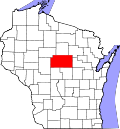This article relies largely or entirely on a single source .(December 2025) |
Bevent, Wisconsin | |
|---|---|
| Coordinates: 44°46′14″N89°23′22″W / 44.77056°N 89.38944°W | |
| Country | |
| State | |
| County | Marathon |
| Elevation | 1,220 ft (370 m) |
| Time zone | UTC-6 (Central (CST)) |
| • Summer (DST) | UTC-5 (CDT) |
| Area codes | 715 and 534 |
| GNIS feature ID | 1561665 [1] |
Bevent is an unincorporated community located in the towns of Bevent and Reid, Marathon County, Wisconsin, United States. [1]


